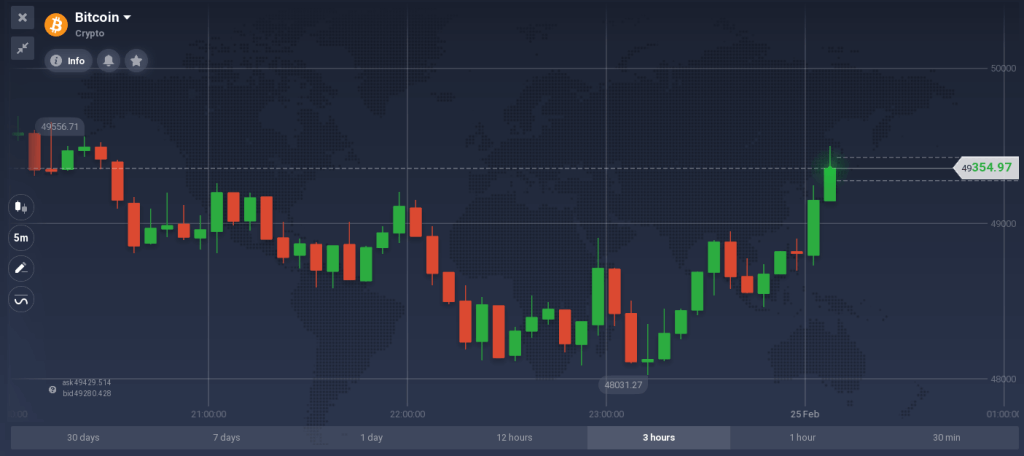Successful CFD Trading on Bitcoin - Our Full Guide
SUCCESSFUL CFD TRADING ON BITCOIN - OUR FULL GUIDE

The popularity of cryptocurrencies and the awareness of general public about them are increasing. As a result, they are becoming a mainstream these days. So, new trading platforms are being created and they are providing an increasing number of people with the access to the global markets. Apart from regular trading, now there is opportunity of trading CFDs (Contracts for Difference) for most of the major cryptocurrencies. So, let’s discuss how you need to trade Bitcoin (BTC) and other cryptocurrency CFDs to earn high profits.

What is Bitcoin?
Bitcoin (BTC) is a digital currency that was invented in 2009. It follows the ideas set out in a whitepaper by the pseudonymous Satoshi Nakamoto. BTC offers the promise of lower transaction fees compared to conventional online payment mechanisms. Unlike currencies issued by the government, it is operated by a decentralized authority.
BTC is a type of cryptocurrency. You will not find any physical Bitcoins. There are only balances that are kept on a public ledger and this ledger offers transparent access to everyone. All transactions of BTC are verified by a huge amount of computing power. No bank or government issues or backs BTC and it is not valuable as a commodity either. It is not legal tender but it is still very popular. BTC has triggered the launch of numerous other cryptocurrencies that are referred to as altcoins collectively.
How do Bitcoin CFDs work?
A CFD is very similar to a future. With a CFD, the seller and buyer agree to pay any difference as price rises or falls in cash, instead of via the delivery of physical goods.
Assume that a trader is very confident that the price of BTC is going to rise in the near future. So, they want to invest in BTC. Now, it may be too complicated to go out and buy BTC, and it is even more of a problem if the trader does not have a verified account on any Bitcoin exchange. So, instead of purchasing actual Bitcoin or a future that would need the delivery of Bitcoin, the trader can simply buy a Bitcoin CFD.
In this arrangement, both the seller and buyer of the contract agree to settle any rise or drop in price at the time of the termination of the contract. If the trader’s prediction about the rise of Bitcoin’s price turns out to be right, then the trader would be paid the difference between the price of the time when the contract was bought and the current price.
On the contrary, if the trader’s prediction turns out to be wrong and prices do not move in their favor, it is the trader that has to pay the difference. So, in a particular sense, it is essentially betting on if the price will rise or drop.
Since it is very simple to conduct a CFD trade, it is very popular among traders as well as several brokerage firms.
What are the Benefits of CFDs?
CFD trading allows you to deal on prices derived from the underlying market. You do not have to deal on the underlying market itself. It is a popular form of trading and it has many benefits, like
- No stamp duty: CFD trading is different than traditional share dealing. You do not have to pay a stamp duty on a CFD trade because you do not have physical ownership of the underlying asset. However, tax treatment can change as it depends on individual circumstances.
- Leverage trading: One of the most important benefits of CFD trading is that it allows investors to trade using leverage. It means that you will not have to put down the full value of a position to trade. Thanks to this, your money is not tied up in one transaction and you can invest it elsewhere.
- Profit from both rising and falling markets: With CFD trading, traders can trade on the price of a product going up, as well as down. So, you can try and benefit from both buying and selling opportunities. There are many investors who use CFDs as a way to hedge their existing portfolios through periods of short-time volatility.
Bitcoin CFDs vs. Bitcoin Futures
Many traders find CFDs and futures entirely identical but there are many differences between these two products, such as
- First, futures have a specific date when they expire, but CFDs do not. A CFD can be kept for as long as it is allowed by the terms of the contract. So, there is no need for you to settle it on a specific date. When the CFD is liquidated, the difference in price would be estimated and paid to the appropriate party.
- Executing trading of CFDs is also easier and has a lower barrier to entry than futures. In general, futures have the tendency to trade on large exchanges and they have a higher minimum commitment because these contracts are mainly for institutional investors to use.
- Moreover, future trading takes place in open markets where everyone can view the orderbook. It allows traders in spotting more opportunities in the market. On the contrary, when it comes to trading CFDs, you trade against a single broker and there is only one price available for trading.
- Another difference between CFDs and futures lies in their spreads. CFDs have higher spreads compared to futures. It means that the difference between the ‘Instant buy’ and ‘Instant sell’ price is higher and it is reflected in the profit of the broker. However, CFDs charge lower fees than futures for their operation.
- Lastly, opening a CFD account is a lot easier than a futures account. In general, there is less regulation when it comes to CFDs. So, you can start trading with a much less capital.
How to Choose the Best Cryptocurrency CFD Trading Platform?
To experience the best of cryptocurrency CFD trading, you need to choose the right CFD broker. To do it, you have to analyze various factors that include ease of deposit or withdrawal, the type of trading platform, commission, and variety of trading instruments. Some of the important factors you must consider include
- Security: Security is the most important factor when it comes to trading. Thankfully, it is fairly easy to check if a broker is secure or not. All you need to do is seeing if it is regulated by one of multiple top-notch financial bodies. For example, brokers licensed and regulated by regulatory bodies like ASIC, FSA, and CyCEC are obligated to comply with strict jurisdictions. Thus, they are considered safer from the rest. Secondly, you need to see if the website of the broker maintains transparency regarding providing information about it. Lastly, the risk management policy of the company must be checked. A broker that values the customers and takes initiative to protect their funds is always a great option.
- Ease of use: CFD or anything else, trading is a complicated enough matter by itself, and the last thing you need is a broker that makes your job more difficult. When you choose a broker, you must see if it has a user-friendly interface so you can trade easily without much hassle. One of the most common issues traders face is the methods of deposits and withdrawals. So, try to find a broker that offers multiple easy ways of funding an account, along with easy withdrawal processes.
- Transaction costs and commissions: If you neglect the costs of transactions and commissions, then you may end up with no significant profits at all even after winning all trades you have executed. Some brokers set commissions and fees for trading and withdrawals too high that it eats up the profits. No trader can escape from paying the cost of conducting trades, and it is even worse for day traders who engage in several trades per day. So, you should go for a broker that offers services at low fees and commissions.
- Trading platform: There are many different types of trading platforms available online. Apart from a few common trading features, each platform is different in its features and capabilities. If the success of trading mostly depends on your skills, knowledge, and experience, then it also depends on the efficiency and capability of your trading platform a bit. So, choose a broker that offers an efficient trading platform with easy but powerful features.
- Price execution times: You must already know that the markers move very quickly. So, it is very important to get the closest market price when profits can change within seconds. Brokers that notify its clients with recent market updates, events and prices are the best options for you to choose from. Keep in mind that you have to move fast and execute trades in seconds to grab a profitable opportunity, and your broker must be able to help you with it.
- Demo account: Lastly, a broker without a demo account must not even be considered. When you are on a new broker and unfamiliar trading platform, it is important to see how things work and how you can use it before you put your money in risk. Practicing your trading strategies and using indicators would help you improve on your trading skills. So, it is essential to research and test a platform thoroughly by using a demo account with virtual funds before using real funds. Whenever you choose your broker, make sure that it offers a demo account.
IQ Option is a great choice if you are looking for a good cryptocurrency trading platform. Maximum crypto leverage is up to 1:10 for non-EU and EU pro traders, while it is 1:2 for EU regular traders on IQ Option. Special cryptocurrencies like Bitcoin is available on this broker for trading with fixed leverage up to x100 for non-EU traders. IQ Option offers more than 16 cryptocurrencies for CFD trading. Minimum deposit and minimum deal required in order to open a position are $10 and $1 respectively. Traders are also provided with the benefit of using unlimited demo account. You can get more information about Cryptocurrency Trading with IQ Option here: Trading Cryptocurrency CFDs With IQ Option
Risks & Benefits of Cryptocurrency CFDs
Cryptocurrency CFD trading has both its benefits and risks.
The benefits include
- You can predict the price of crypto and profit from it without owning the crypto.
- You have no need to deal with crypto exchanges or open crypto storage wallets.
- Trading platforms are regulated that offers security to your funds.
- You are allowed to trade on leverage that magnifies your profits.
- Cryptocurrency CFD brokers offer access to numerous popular cryptos.
- Trading cryptocurrency CFD is easy to start with fiat currency.
- You can gain profits from both rising and falling markets.
Obviously, like any form of trading, cryptocurrency CFD trading also has some risks that you must be careful of, including
- Margin magnifies profits, but it also increases the potential of losses while trading.
- Cryptocurrencies and CFDs are highly speculative.
- Cryptocurrencies are highly volatile.
- CFD trading is not ideal for long-term investment.
FAQ:
CFDs are a great investment as only have to deal on prices from the underlying market and not the market itself. It allows you to use leverage, go short or long, and hedge your portfolio.
CFDs do not expire. So, you can hold both short and long position as long as you can fund it. However, it starts to get expensive after 4-6 weeks. Hence, CFDs are more suitable for short-term trading.
Trading CFDs with leverage increases your chances of gaining more profits, but you can also buy CFDs without leverage.
You should not buy cryptocurrency CFDs when the price is high. The best time to buy a cryptocurrency CFD is when the price is low.
